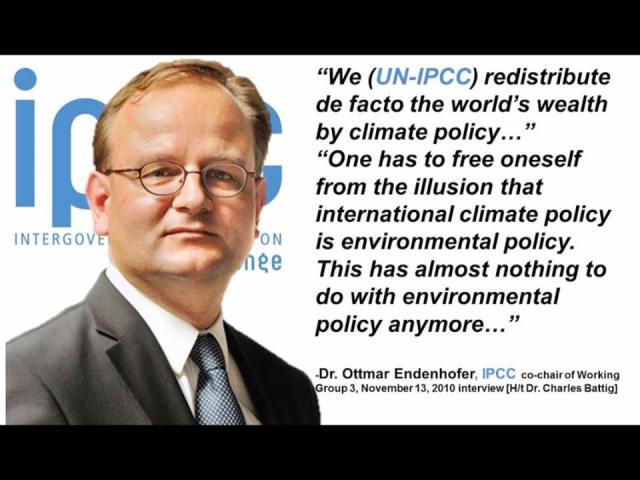
United Nations Intergovernmental Panel on Climate Change (IPCC) official Ottmar Edenhofer. In an interview with Germany’s NZZ Online: Edenhofer lays out just what the climate talks are all about:
NZZ: The new thing about your proposal for a Global Deal is the stress on the importance of development policy for climate policy. Until now, many think of aid when they hear development policies.
Edenhofer: That will change immediately if global emission rights are distributed. If this happens, on a per capita basis, then Africa will be the big winner, and huge amounts of money will flow there. This will have enormous implications for development policy. And it will raise the question if these countries can deal responsibly with so much money at all.
NZZ: That does not sound anymore like the climate policy that we know.
Edenhofer: Basically it’s a big mistake to discuss climate policy separately from the major themes of globalization. The climate summit in Cancun at the end of the month is not a climate conference, but one of the largest economic conferences since the Second World War. Why? Because we have 11,000 gigatons of carbon in the coal reserves in the soil under our feet—and we must emit only 400 gigatons in the atmosphere if we want to keep the 2-degree target. 11 000 to 400—there is no getting around the fact that most of the fossil reserves must remain in the soil.
NZZ: De facto, this means an expropriation of the countries with natural resources. This leads to a very different development from that which has been triggered by development policy.
Edenhofer: First of all, developed countries have basically expropriated the atmosphere of the world community. But one must say clearly that we redistribute de facto the world’s wealth by climate policy. Obviously, the owners of coal and oil will not be enthusiastic about this. One has to free oneself from the illusion that international climate policy is environmental policy. This has almost nothing to do with environmental policy anymore, with problems such as deforestation or the ozone hole.
At the Copenhagen COPE meeting, Janos Pasztor, the director of U.N. Secretary-General Ban Ki-moon’s Climate Change Support Team, admitted: “This is not a climate-change negotiation. … It’s about something much more fundamental. It’s about economic strength.” The nations at the negotiation, he added, “just have to slug it out.”
On the same date, Edenhofer added this:
Climate policy has almost nothing to do anymore with protecting the environment. The next world climate summit in Cancun is actually an economy summit during which [re]distribution of the world’s resources will be negotiated.

Reference for chart and more information:
https://www.un.org/en/development/desa/policy/wess/wess_current/2012wess.pdf
An Unconstrained Bureaucracy: https://tambonthongchai.com/2019/02/25/un/?fbclid=IwAR3Or_duNhNM-0XRCzylYYxun_0C26SnsKAaelYHnKdcKBoN0aLatQSlJzE

You must be logged in to post a comment.